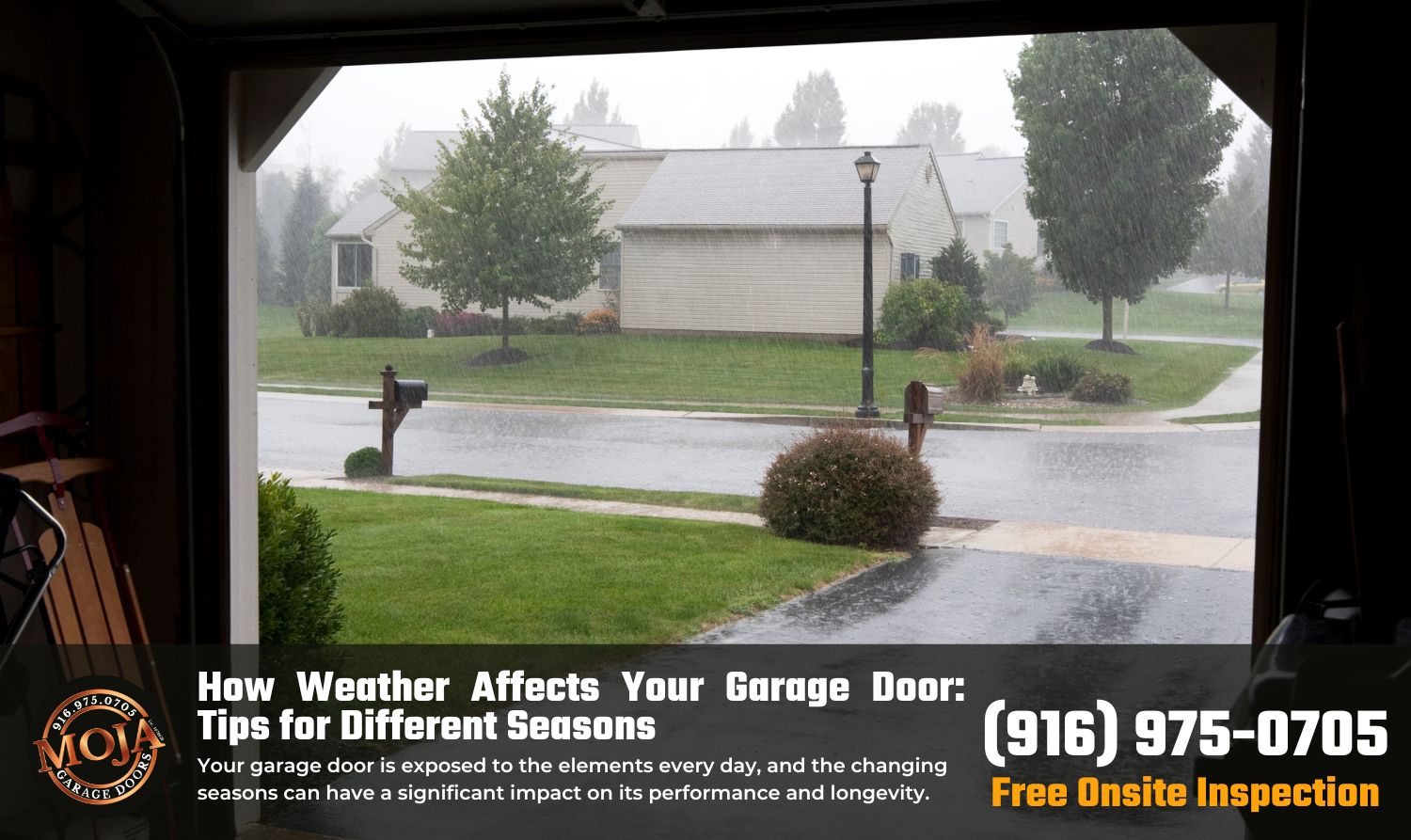The Impact of Weather on Garage Doors
Your garage door is exposed to the elements every day, and the changing seasons can have a significant impact on its performance and longevity. Whether it’s the heat of summer, the chill of winter, or the rain and wind during the spring and fall, weather conditions can affect how well your garage door operates.
In this article, we will explore how weather affects your garage door throughout the year and provide seasonal tips to help maintain your door and ensure it stays functional, safe, and efficient.
How Weather Affects Your Garage Door in Different Seasons
1. Winter: Cold Temperatures and Frozen Components
Winter can be harsh on your garage door, especially in regions that experience freezing temperatures and snow. The cold can affect both the mechanical components of your door as well as the door’s performance.
How Cold Weather Affects Garage Doors:
- Frozen Springs and Cables: Cold weather can cause your garage door springs and cables to freeze or become stiff, making it harder for the door to open or close properly. Frozen springs are at risk of breaking when forced to operate under tension, leading to costly repairs.
- Thickened Lubricants: The cold can cause lubricants in the door’s moving parts (like rollers and tracks) to thicken and lose their effectiveness, leading to sluggish operation.
- Weather Stripping Deterioration: The rubber seals around your door are also susceptible to freezing temperatures, which can cause them to become brittle or crack. This can lead to drafts, energy loss, and potential water damage inside the garage.
Tips for Winter Garage Door Care:
- Lubricate moving parts: Use a silicone-based lubricant to keep the moving parts (such as rollers and tracks) functioning smoothly even in colder temperatures.
- Inspect weather stripping: Ensure the weather seals are in good condition and replace any damaged or brittle seals to prevent drafts or water infiltration.
- Keep springs tensioned: Have a professional technician inspect and adjust the spring tension to ensure they are in good working condition before the cold weather sets in.
2. Spring: Rain and Moisture Challenges
Springtime often brings rain, moisture, and fluctuating temperatures. The moisture can create a unique set of challenges for your garage door system, especially if it’s not maintained properly.
How Spring Weather Affects Garage Doors:
- Rust and Corrosion: The combination of moisture and fluctuating temperatures can cause metal parts (such as springs, tracks, and hinges) to rust. Rust buildup can lead to stiffness, reduced performance, and potential failure of parts.
- Expansion and Contraction: As temperatures fluctuate in the spring, parts of your garage door may expand and contract, which can affect the door’s alignment and cause it to become unbalanced.
- Water Damage: If your garage door is not properly sealed, rainwater can leak inside, causing damage to the floor, insulation, and other items stored inside the garage.
Tips for Spring Garage Door Care:
- Inspect for rust: Regularly check the metal parts of your garage door for signs of rust or corrosion. If necessary, clean and lubricate these parts to prevent further damage.
- Seal cracks and gaps: Inspect the weather stripping and seals around the door. If you find any gaps, replace the seals to prevent water from entering your garage.
- Balance your door: Ensure that the door opens and closes evenly. If not, contact a professional to have it re-balanced, as spring temperature changes can impact its alignment.
3. Summer: Heat and Humidity Risks
The hot summer months bring intense heat and humidity, both of which can place stress on your garage door system. While summer heat may not cause immediate damage, the extended exposure to high temperatures can still have long-term effects.
How Summer Weather Affects Garage Doors:
- Heat Expansion: The intense heat can cause the materials of your garage door (especially if it’s made of wood or aluminum) to expand, potentially leading to warping or misalignment.
- Increased Wear on Springs and Openers: During hot weather, your garage door opener motor works harder to lift the door. This can cause additional strain on the opener, resulting in mechanical failure over time.
- Moisture and Humidity: While humidity is generally higher in the summer, it can also cause damage to the weather stripping or lead to mold and mildew growth if your garage is not properly ventilated.
Tips for Summer Garage Door Care:
- Check for door misalignment: Ensure that the door is aligned properly and opens and closes smoothly. If you notice any problems, call a professional technician to fix it before it worsens.
- Check for moisture: Ensure that humidity isn’t entering your garage. Use dehumidifiers if necessary, and inspect the seals to prevent moisture damage.
- Clean your door regularly: Excess dust and dirt can accumulate on your door in the summer heat, so make sure to clean your door regularly and inspect for any damage or wear.
4. Fall: Wind and Falling Debris Issues
Fall is a season of transition, where temperatures drop, and windy weather becomes more common. The season also brings falling leaves, debris, and increased rainfall, which can all impact your garage door.
How Fall Weather Affects Garage Doors:
- Debris Blockage: Falling leaves, twigs, and other debris can accumulate in the tracks or weather stripping, preventing the door from operating smoothly.
- Wind Damage: The strong winds that often accompany fall storms can place extra stress on your garage door, especially if the door is not properly secured or has worn-out parts.
- Temperature Fluctuations: Like spring, the temperature fluctuations between day and night in the fall can cause parts of your garage door to expand and contract, affecting alignment.
Tips for Fall Garage Door Care:
- Clean tracks and weather stripping: Regularly clear leaves and debris from the tracks to ensure smooth operation. Also, inspect and clean the weather stripping.
- Inspect and tighten hardware: Check for any loose nuts or bolts that may have come undone due to fall winds. Tighten them to ensure everything is secure.
- Prepare for winter: As fall comes to a close, start preparing your door for the colder months. Consider adjusting the tension on the springs and lubricating the moving parts.
General Year-Round Tips for Garage Door Maintenance:
In addition to the seasonal tips above, there are some general maintenance practices that can help keep your garage door in top shape all year round:
- Regular Lubrication: Keep the moving parts of your garage door well-lubricated to ensure smooth operation and prevent excessive wear and tear.
- Weatherproofing: Ensure that the weather seals are intact and free of cracks, as they help protect your garage from the elements.
- Balance and Alignment Check: Have your garage door checked for proper balance and alignment regularly to avoid operational issues.
- Professional Inspections: Have a professional technician inspect your garage door at least once a year to identify and resolve any issues before they become more serious.
Weatherproof Your Garage Door for Every Season
Your garage door is a vital part of your home’s functionality, and its performance can be significantly impacted by weather conditions. By following these seasonal tips and maintaining your garage door throughout the year, you can ensure that it stays functional, safe, and efficient regardless of the weather.
At MOJA Garage Doors, we are committed to helping homeowners keep their garage doors in optimal condition. If you need help with seasonal maintenance or repairs, our team of experts is just a phone call away. Let us help you weather-proof your garage door!
Call to Action:
Ensure your garage door is ready for every season with the help of MOJA Garage Doors. Contact us for a professional inspection, maintenance, or repair today.
📞 Call Now: (916) 975-0705
🌐 Visit Us: mojagaragedoors.com


